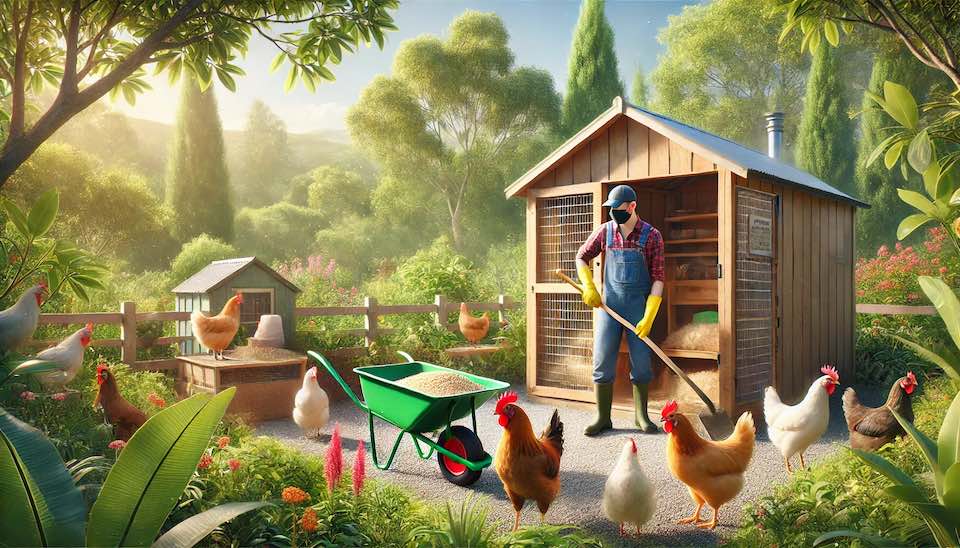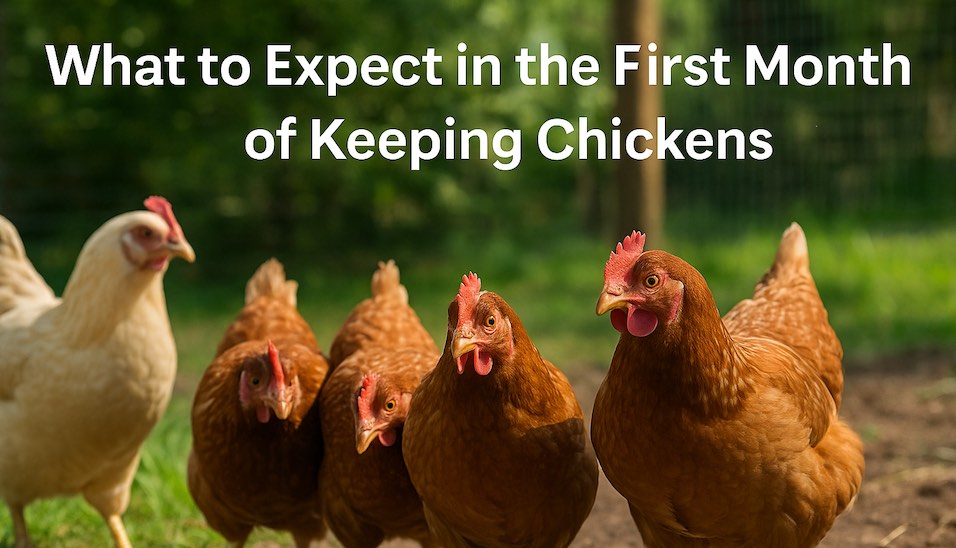A Step-By-Step Guide to Cleaning the Chicken Coop
Cleaning the Chicken Coop
Contrary to common belief, chicken coops don't have to stink. In fact, a stinky chicken coop should be the exception, not the rule. Unless there has been wet weather, your chicken coop is unlikely to smell at all if you clean it regularly.
No one loves to do it, but cleaning out the chicken coop is an essential task if you want to keep healthy, happy hens.
A dirty coop is likely to spread diseases and parasites within your flock, so maintaining a clean chicken coop is key to plenty of fresh eggs.
Why You Should Clean the Chicken Coop
No one wants to live near a smelly chicken coop, and your chickens don't want to live in one!
Here are the top 5 reasons why you should clean your chicken coop regularly:
- Stop the smell
Wet floor litter and built up droppings produce ammonia. And ammonia is the main cause of smelly chicken coops. No one wants to live near a smelly coop, so keeping the coop clean keeps you and your neighbours happy.
Ammonia doesn't just stink, it can also damage chickens' delicate respiratory systems and cause disease. So if you want to take good care of your birds, that includes keeping the coop clean. So clean it doesn't smell!
- Keep your flock healthy
Chicken droppings can spread many chicken diseases between birds. Some deadly illnesses, such as coccidiosis, are spread only through droppings! Keeping a clean coop can also reduce the risk of Avian Influenza.
The more built-up droppings there are in your coop, the more likely it is that your birds will become ill, because they are being more frequently exposed to whatever illness and disease might be present in the flock. A clean coop is key to a healthy flock!
- Prevent parasites
Internal parasites, such as worms and coccidia, are spread through chicken droppings. They also thrive in wet, dirty litter. While most chickens can cope with a small worm burden, especially if they are also dewormed regularly, constant exposure to high levels of worms, which is what happens in a filthy coop, can cause all sorts of health issues and even death!
Mites and other external parasites live in the chicken coop. Regular cleaning and the removal of dirty litter from the coop keeps parasite numbers down, helping protect your chickens!
- Deter pests
Dirty litter provides a haven and breeding ground for all types of insect pests, including flies and cockroaches. Not only are these insects unwanted in the chicken coop, they can also spread disease!
Rodents are attracted to chicken coops by the easy source of food. If your coop regularly has spilled feed on the floor, it is dead certain that rodents will move in. The smell produced by spoiling feed and wet litter is enough to attract rats and mice from the whole neighbourhood!
- Keep eggs clean
Dirty eggs are a pain. They are difficult to clean (learn how to clean eggs safely here) and might carry diseases. A dirty coop and wet floor litter often cause dirty eggs, as chickens have dirty feet and spread droppings and mud into the nesting box, as well as stepping on any eggs already in there. So keeping the coop clean helps keep eggs clean too!
How Often Do Chicken Coops Need Cleaning?
How often your chicken coop needs cleaning will depend on many factors, including:
- How many chickens you have
- How big the coop is and how much time your birds spend there
- What type of floor litter you use and whether it gets wet, e.g. from rain, Drinkers etc.
- Whether you use a droppings board or do spot cleans
If you do spot cleans, just removing visible droppings or wet litter, every few days, you will probably only need to clean the coop every few weeks. A droppings board that is cleaned every day or so can also stop you from having to clean the coop so often.
If you don't remove any droppings between cleans and don't have a droppings board, you will probably need to clean the chicken coop once a week, even if you only have a very small flock. The main exception to this is if you have a deep litter system.
As a simple rule of thumb, if the floor litter is wet, you can smell ammonia, or there are visible droppings, you need to clean the coop.
Chicken coops should also be cleaned if you have had any signs of illness within your flock. Remove and isolate sick birds, then clean and disinfect the coop. This is the best way to prevent any illness from spreading.
How To Clean a Chicken Coop Properly
Cleaning a chicken coop properly is easy!
The chicken coop should get a deep clean, meaning a scrub with soap and water, plus disinfecting, at least once every 6 months and more often in areas with a high disease risk or parasite burden. In Avian Influenza areas, regular cleaning and disinfecting is recommended.
The rest of the time, a normal clean will be enough. That means cleaning out all of the litter and bedding, sweeping the coop and replacing the litter.
You will need:
- A face mask
- A shovel or pitch fork, depending on the type of litter
- A bin or wheelbarrow to remove the dirty litter
- A dust pan and brush, or a broom, depending on the size of your coop
- A bucket with soap and warm water, and a cleaning brush
- A disinfectant - veterinary disinfectants such as Virkon S are great, but even vinegar works
- Clean litter (we go through choosing the best chicken bedding here)
- Optional: Nesting Herbs
Instructions:
1. Prepare and Protect Yourself
Cleaning the chicken coop is not just about keeping your flock healthy, but also about protecting your family. Chicken coops can harbour bacteria, dust, and diseases that can affect your health if proper precautions aren't taken.
Although it is very unlikely that you would catch something from your chickens or from cleaning the chicken coop, it is possible. Fortunately, staying safe is easy! Here’s how to protect yourself:
Wear a Mask and Gloves: Chicken coops can harbor bacteria and dust that can irritate your lungs or cause diseases. Always wear a mask to protect against airborne particles and wet down bedding and litter. Using gloves is also recommended, and especially if you have any cuts or sores on your hands.
Change Clothes Afterward: Once you’re done cleaning, immediately change your clothes and wash them. This prevents you from carrying any potential diseases back into your home.
Wetting Down Bedding: Before removing bedding, lightly spray it with water to reduce the amount of dust and dander that can become airborne. This also helps reduce your exposure to harmful particles.
Practice Good Hygiene: It is common sense - wash your hands after cleaning the chicken coop and before you do anything else. Have a shower and wash your hair as soon as you can.
2. Remove and Clean Everything
Chickens: While we don't recommend cleaning your chickens, you should remove them from the coop before cleaning. Although you can clean around chickens, and Virkon S is safe for use with poultry, it is still best to remove your chickens from the coop before you clean. They'll only get in your way and slow you down, trying to peck at bugs underneath each scoop of bedding you remove!
Feeders and Drinkers: Don't just clean the coop. Clean and sanitise your Chicken Feeders and Drinkers too. You'd be amazed how many chicken keepers fail to do this!
Wash your Feeders and Drinkers with warm soapy water and a soft cloth, rinse thoroughly and allow to dry in the sunlight. Disassemble Lubing Cups and remove the base of the Feeder to clean properly. Never use scourers or stiff brushes. Do not use boiling water or put your Chicken Feeders or Drinkers in the dishwasher!
If you are disinfecting your Feeders and Drinkers, ensure whatever product you use is safe for chickens to eat and is not going to damage the Feeder or Drinker material.
Other Equipment: Remove any other loose items from the coop, such as roosts, droppings boards, chicken toys and nesting boxes. Scrub thoroughly with a brush, wash with soapy water, rinse and allow to dry. Pay special attention to crevices where dirt and droppings can build up. Drying items in the sun can help to sanitise them.
3. Clean Out Old Bedding and Droppings
Once you have removed all loose items from the chicken coop, use a shovel or pitch fork to remove all the old bedding and droppings from the coop. A wheelbarrow or bin to put the bedding in to can be helpful.
Chicken bedding and droppings are a great addition to the compost pile and make an excellent addition to the garden once composted. Learn how to compost chicken manure here.
4. Wash and Disinfect the Coop
Wash Surfaces: Once the bedding is removed, use a stiff brush and warm, soapy water to scrub all surfaces of the coop, including walls, floors, and roosts. Ensure all visible dirt is cleaned, as a disinfectant won't work if there is visible dirt or poop!
Rinse and Dry: Rinse the coop (a hose will make this job easier) and allow it to dry thoroughly. If you have a wooden coop, rinse surfaces using a bucket of clean water and a cloth to prevent soaking the wood.
Disinfect: Once the coop is dry, apply a poultry-safe disinfectant such as Virkon S to all surfaces.
Be sure to follow the disinfectant instructions for proper dilution and application. Let the disinfectant sit for the recommended time to ensure it kills any lingering bacteria, viruses, or fungi. Some disinfectants should be left to dry, while others should be rinsed off.
Learn more about disinfecting the chicken coop here.
Dry Thoroughly: Once disinfecting is complete, it is important that you let the coop dry thoroughly before replacing bedding or equipment
5. Replace Bedding and Set Up the Coop
Once the coop is dry, spread fresh, clean bedding evenly across the floor. Make sure it's thick enough to absorb moisture and provide a comfortable surface for your chickens. You can compare chicken bedding types here. Adding Nesting Herbs will make the coop smell lovely and fresh.
To combat mites, lice and other pests, a chicken-safe insecticide or Diatomaceous Earth can be used underneath the bedding and in any cracks or crevices where pests might hide.
Replace Feeders, Drinkers, and other equipment, ensuring they are also clean and dry.
Then let your chickens back in to enjoy their lovely, fresh coop!
After cleaning the chicken coop, you should always wash your hands thoroughly before doing anything else. We recommend that you have a shower, wash your hair and wash all of the clothes you wore in the coop as well.
Tips for Maintaining a Clean Chicken Coop
There are many ways to keep your chicken coop cleaner. Not only does a cleaner coop mean less work for you, it means healthier chickens too!
Use a Droppings Board
One of the best possible tips for keeping the coop cleaner is using a droppings board.
A droppings board is a board placed underneath the roosts and cleaned every day. The droppings board collects all of the droppings from your chickens overnight, preventing them from falling into the floor litter. For free-range chickens, this might be 80 % of the droppings that are deposited in the coop, so you can imagine how much cleaning it saves!
The droppings board should be cleaned every day, and the droppings disposed of. Some chicken keepers like a smooth board, because it is easy to scrape. Others fill the board with sand or even kitty litter, and scoop the droppings out!
Choose a Suitable Floor Litter
Some chicken coop litter materials are better than others. The more absorbent the floor litter is, the less often it will need cleaning. For this reason, smaller particle litters are better - wood shavings, sand etc.
Any floor litter that allows you to easily scoop out wet parts and piles of droppings while leaving the clean litter is also handy, as it will make spot cleaning easier. Sand is great for this!
Straw is a notoriously bad chicken coop floor litter because it isn't very absorbent and does not mix easily with droppings, so they pile up and release ammonia. If you are using straw, choose chopped straw as it is much more absorbent.
Keep Out the Wet
Wet litter and wet droppings make a mess and produce ammonia, which is what makes a chicken coop stinky. Make sure your Drinker doesn't leak and design your coop so rain cannot get inside. If chickens with wet feet are a problem, consider getting a door mat for the coop to help keep the litter dry!
Spot Clean Regularly
The more often you pick up droppings in the coop, the less often you will need to do a complete clean and replace the floor litter!
Keep Feed Off the Floor
Feed that ends up on the floor will be contaminated with chicken droppings, spreading disease if your chickens eat it.
But even more importantly, spoiling food is a main attractant for rats and other unwanted pests. So keeping feed off the floor not only keeps the coop cleaner, it deters pests that make the coop dirtier! Try a Dine-A-Chook Waste Reducing Feeder.
Frequently Asked Questions about Cleaning the Chicken Coop
1. Will chickens stop laying if the coop is dirty?
Yes, a dirty chicken coop can cause hens to stop laying eggs. Unsanitary conditions lead to stress and health issues, reducing egg production. Keeping the coop clean ensures your chickens remain healthy and continue laying regularly.
2. How often should I clean out the chicken coop?
Clean your chicken coop at least once a week, or more frequently if you have a large flock or a small coop. Regular spot cleaning every few days helps maintain hygiene. A deep clean with disinfectant like Vetsense Coop Clean Spray is recommended every six months.
3. What should I do after cleaning the chicken coop?
After cleaning, allow the coop to dry thoroughly. Sprinkle DE or Poultry Dust to prevent mites and lice. Add fresh bedding, and consider using Nesting Herbs for a pleasant scent and extra pest control. Replace feeders and drinkers, then let your chickens back in to enjoy their fresh home.
4. Can a dirty coop attract predators?
Yes, a dirty coop can attract rodents like rats and mice due to spilled feed and waste. These rodents can attract larger predators such as snakes and foxes. Keeping the coop clean and using rodent-proof feeders helps deter unwanted pests. Using products like Envirosafe Fly Traps can help reduce insect pests.
5. Should I clean the coop during winter?
Absolutely! Regular cleaning during winter is essential, as chickens spend more time indoors, leading to faster waste build-up. A clean coop prevents moisture and ammonia accumulation, which can cause respiratory issues. Ensure the coop is dry and warm after cleaning to keep your flock comfortable.
6. How can I prevent moisture build-up in the coop?
Prevent moisture by ensuring proper ventilation and using absorbent bedding like wood shavings or sand. Fix any leaks promptly, especially from drinkers or rain. Removing wet bedding immediately helps keep the coop dry.
7. What are the signs that the coop needs cleaning?
Signs include a strong ammonia smell, wet or soiled bedding, increased flies or pests, dirty eggs, and chickens showing signs of illness like respiratory issues or reduced egg production. If you notice any of these signs, it's time to clean the coop.
8. Can I use the deep litter method for my coop?
Yes, the deep litter method involves layering fresh bedding over old bedding, allowing it to compost inside the coop. This method provides natural insulation and reduces cleaning frequency. Regularly turn the bedding and monitor for ammonia build-up.
9. How do I clean a coop after a disease outbreak?
First, isolate any sick birds to prevent the spread of disease. Remove all bedding and thoroughly clean the coop with soap and water. Disinfect using a poultry-safe product like Vetsense Coop Clean Spray. Clean all equipment, including feeders and drinkers. Allow everything to dry completely before adding fresh bedding and returning your flock.
10. Is it safe to use chemicals in the coop?
Use only poultry-safe chemicals in the coop. Avoid harsh substances that could harm your chickens. Natural options like Envirosafe Fly Traps are effective and non-toxic. Always read labels carefully and follow the instructions to ensure the safety of your flock.
Happy chicken keeping!
Rachael at Dine-A-Chook Australia




